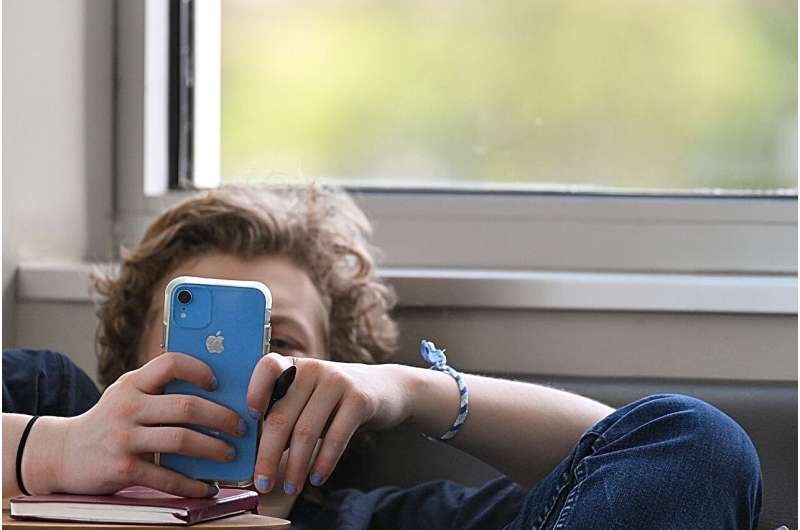This article has been reviewed according to Science X's editorial process and policies. Editors have highlighted the following attributes while ensuring the content's credibility:
fact-checked
trusted source
proofread
Research reveals possible link between teen personalities, social media preferences and depressive symptoms

Teens using social media are vulnerable to depressive symptoms and some platforms, like TikTok, Instagram and YouTube, may be linked to higher levels of depression than others, according to West Virginia University research.
Amy Gentzler, professor of psychology at the WVU Eberly College of Arts and Sciences, as well as graduate students Jacob Alderson, Jeff Hughes and Matty Johnston, published an article in the Journal of Adolescence from a study on how teens use social media and how specific platforms relate to depressive symptoms. They considered attributes like gender, personality and self-esteem.
While studies have looked at social media's effects on overall teen mental health, Gentzler wanted to see how individuals are differentially affected.
"The goal was to consider the individual people more than research has done in the past," she said. "It's good to look at your teen and ask, 'Who are they as a person? How does that influence how they navigate these apps?' I think that's a much more interesting question as a researcher, and it's also much more important for parents and educators to consider."
Gentzler's research revealed a subject's personality—in particular the degree of extroversion—can determine how they experience social media. Findings indicated teens with higher levels of extroversion who use Instagram often may not experience depression, whereas those with low and average levels of extroversion may be at risk for greater depressive symptoms.
Alderson focused on the role personality played in the study.
"When we're thinking about personality and social media, we're thinking about how your general disposition influences how you navigate and interact with these platforms," he explained, adding that social media platforms use predictive algorithms to match the content users see to their personality and interests.
"If your teen is highly extroverted or has even average levels of extroversion, the social media content they see and how they interact with that content may differ relative to teens lower in extroversion," Alderson continued. "I think that gets at some of the negative affective reactions to social media that we saw as well, particularly for an app like TikTok that's tailored to them through an algorithm."
The researchers believe it's important for teens to take note of how they feel on a social media platform.
"Those cognitions you have while you're navigating an app are important," Alderson said. "A teen could take a step back and think, 'What is it I'm consuming on this platform? And when I'm scrolling through, what am I thinking about? Do I feel better or worse after I've scrolled TikTok for 30 minutes?' As the study talks about, there are different ways of interacting with social media platforms, which in turn may influence how you feel after using them."
This may be because extroverted teens are likely to have more friends who will like and interact with their posts, thereby making their experiences on Instagram more rewarding. Also, extroverted people tend to have more positive outlooks and may interpret negativity on social media in a more positive way.
Gentzler said passively using social media rather than actively communicating directly with others has been found to be particularly problematic for teens' mental health. While Instagram users often interact with friends, TikTok users usually watch videos from strangers.
TikTok was also associated with higher depressive symptoms, but only for teens who said they were likely to have negative thoughts and feelings while using social media. For the teens who reported they were unlikely to have negative reactions to social media, TikTok was unrelated to depressive symptoms.
"Social comparison is common for adolescents both in person and online," she said. "Thus, it is possible that these teens who already said they're prone to negative thoughts and feelings may be comparing themselves to people they see on TikTok and feeling badly about themselves as a result."
This study also suggested teens who were more often on YouTube reported higher levels of depressive symptoms, and the association did not vary based on gender, self-esteem or personality.
The study included 237 participants, most from West Virginia, aged 14 to 16. Gentzler employed the help of students in the research.
In addition to creating surveys and planning, her undergraduate research assistants assisted with data collection while the study leads met with parents and teens.
"They would pile in the cars with us at five in the morning to get to high schools because we were not just going to Monongalia County—we were all over," Gentzler said. "Sometimes the undergraduates would present to entire homerooms, trying to get students interested in our study. The undergraduate students got a lot of experience, and it was nice to see a lot of them go on to graduate school and use what they've learned."
According to Gentzler, the big takeaway is how people react differently to social media.
"Researchers are often trying to find direct associations between time on social media and depressive symptoms," she said. "Sometimes that holds, but it's not going to be the same association for everyone. Some people might be prone to more bad feelings than good when using social media, so we need to recognize that we're all different."
More information: Amy L. Gentzler et al, Which social media platforms matter and for whom? Examining moderators of links between adolescents' social media use and depressive symptoms, Journal of Adolescence (2023). DOI: 10.1002/jad.12243


















